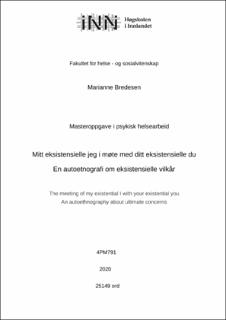| dc.contributor.author | Bredesen, Marianne | |
| dc.date.accessioned | 2021-02-02T11:58:58Z | |
| dc.date.available | 2021-02-02T11:58:58Z | |
| dc.date.issued | 2020 | |
| dc.identifier.uri | https://hdl.handle.net/11250/2725792 | |
| dc.description.abstract | Bakgrunn: Denne studien er skrevet med bakgrunn i forfatterens egne opplevelser med utgangspunkt i en utfordrende periode av livet. Den bidro til at hun valgte å legge ut på en eksistensiell reise for å møte sitt eksistensielle jeg. Forfatteren har en formening om at eksistensielle spørsmål og eksistensielle vilkår har en betydning for hvem hun er som menneske, og hun ønsker å undersøke hvordan eksistensielle vilkår kan bidra til utvikling av henne som menneske, medmenneske og psykisk helsearbeider. Dette med bakgrunn i at hun ser det som ønskelig og nødvendig at det framtidige psykiske helsearbeidet tar en større form av medmenneskelighet. Dette betinger en større nærhet i relasjonen mellom brukeren og den psykiske helsearbeideren enn hva tradisjonen tilsier. Forfatteren ser det som nyttig å kunne diskutere dette ut fra et filosofisk - etisk perspektiv. Det finnes lite forskning, teori og litteratur omkring eksistensielle vilkår og eksistensialisme innenfor psykisk helsearbeid. Det er behov for mer forskning omkring dette temaet.
Formål: Hensikten med studien er å bidra til at det psykiske helsearbeidet får en økt bredde i sin tilnærming, både tverrfaglig, flerfaglig og kunnskapsmessig. Utover dette er studien ment som en selvutviklingsprosess.
Metode: Studien er skrevet som en autoetnografi hvor forfatteren har benyttet seg selv som empiri. Metodisk benyttes selvfleksjon og refleksiv skriving benyttes som analyse redskap.
Funn og konklusjon: Målet er å skape forståelse og kunnskap hos leseren i møte med teksten, videre skape refleksjon og innsikt omkring temaene studien beskriver. Hvis eksistensielle temaer og eksistensielle vilkår oppleves dit hen at de oppnår det nevnte eller oppleves å utfordre den rådende diskursen i det psykiske helsearbeidet, har forfatteren lykkes i bruk av metoden. For forfatterens egen del oppleves utforskning av eksistensielle vilkår som en nyttig selvutviklingsprosess, hvor hun nå opplever å kunne stå stødigere i møte med ditt eksistensielle du.
Nøkkelord: eksistensialisme - eksistensielle vilkår - det eksistensielle jeg - livsfilosofi - filosofiske samtaler – autoetnografi – refleksiv skriving | en_US |
| dc.description.abstract | Abstract Background: The author’s personal experience from a challenging time in her life constitutes the background to this study. Hence, the author undertook an existential journey to meet her existential I. She believes that existential questions and ultimate concerns are of critical importance when it comes to understanding who she is as a human being. Therefore, she seeks to explore how ultimate concerns can be useful for the development of one’s self as a human being, a fellow human, and a mental health worker. She thinks it is desirable and necessary that mental health work in the future becomes more compassionate. This would necessitate a closer relationship between service users and mental health workers compared to what the tradition has been so far. The author views it as useful to discuss these matters from a philosophical and ethical perspective. There is little research, theory and literature on ultimate concerns and existentialism in mental health work. More research is needed on this topic.
Methods: This thesis is an autoethnography where the author uses herself as research material. Methodical self - reflection and reflexive writing are used as analytical tools.
Aims: The main aim of the thesis is to contribute to mental health work adopting a wider perspective in its approach - with respect both to interdisciplinarity, multidisciplinary and in terms of knowledge. Furthermore, the thesis is meant to constitute a process of selfdevelopment.
Findings and conclusion: The purpose of the thesis is to contribute to understanding and knowledge for the readers in the process of their meeting with the text, as well as to develop insight through reflection on the themes presented. If the existential themes and ultimate concerns are experienced as described in the thesis or challenge the prevailing discussions in mental health work, the author will have succeeded in her use of the autoethnographic method. For the author herself, the exploration of ultimate concerns has been useful from a perspective of self - development, and she now stands more supported in her meeting with the existential You.
Key-words: existentialism – ultimate concerns – the existential I – philosophy of life – philosophical conversations – autoethnography – reflexive writing | en_US |
| dc.language.iso | nob | en_US |
| dc.subject | filosofiske samtaler | en_US |
| dc.subject | skriving | en_US |
| dc.title | Mitt eksistensielle jeg i møte med ditt eksistensielle du. En autoetnografi om eksistensielle vilkår | en_US |
| dc.title.alternative | The meeting of my existential I with your existential you. An autoethnography about ultimate concerns | en_US |
| dc.type | Master thesis | en_US |
| dc.subject.nsi | VDP::Medisinske Fag: 700::Helsefag: 800 | en_US |
| dc.source.pagenumber | 78 | en_US |
